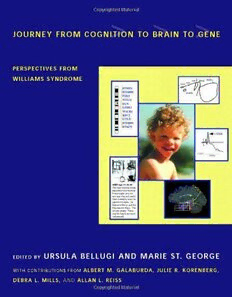
Journey from Cognition to Brain to Gene: Perspectives from Williams Syndrome PDF
211 Pages·2001·4.497 MB·English
Most books are stored in the elastic cloud where traffic is expensive. For this reason, we have a limit on daily download.
Preview Journey from Cognition to Brain to Gene: Perspectives from Williams Syndrome
Description:
A blueprint for the investigation of neurodevelopmental disorders, this book presents the work of a team of scientists using a multidisciplinary, integrated approach to link genes with human behavior. Using Williams syndrome as a model, leading researchers in neuroanatomy, neurocognition, neurophysiology, and molecular genetics have built bridges between disciplines to link higher cognitive functions, their underlying neurobiological bases, and their molecular genetic underpinnings. One of the book's many strengths is that the scientists from each discipline studied the same individuals with Williams syndrome. As the book shows, Williams syndrome is a fascinating disorder because of the "peaks and valleys" among cognitive domains: severe intellectual deficits but remarkably spared and effusive language; specific impairment in spatial construction but great strength in face processing and sociability. By capitalizing on these dissociations in higher cognitive functioning, the book provides a model for the study of brain-behavior relationships as well as for the mapping of brain and behavior phenotypes to the genome and beyond.Contributors Ralph Adolphs, Twyla Alvarez, Lawrence Appelbaum, Ursula Bellugi, Dennis Burian, Xiao-Ning Chen, Michael Chiles, Stephan Eliez, Albert Galaburda, Hanao Hirota, Wendy Jones, Julie Korenberg, Zona Lai, Liz Lichtenberger, Alan Lincoln, Rumiko Matsuoka, Debra Mills, Helen Neville, Judy Reilly, Allan Reiss, Bruce Roe, Marie St. George, J. Eric Schmidtt, Erica Straus.
See more
The list of books you might like
Most books are stored in the elastic cloud where traffic is expensive. For this reason, we have a limit on daily download.
